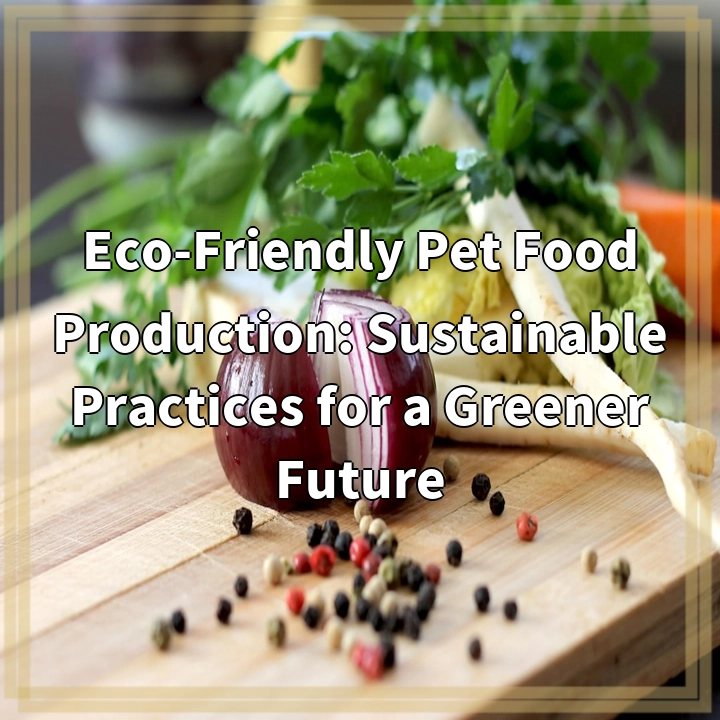
What it is:
Eco-friendly pet food production refers to the creation of pet food using sustainable, environmentally responsible practices. This involves sourcing ingredients that minimize harm to the planet, such as organic grains, ethically-raised meat, and sustainable fish stocks. The production processes often prioritize reducing waste, using renewable energy sources, and implementing eco-friendly packaging.
Benefits of Eco-Friendly Pet Food
Choosing eco-friendly pet food can significantly impact both pet health and the environment. These products typically contain higher-quality ingredients free from harmful additives and preservatives, which can lead to healthier pets. Furthermore, sustainable practices help reduce the carbon footprint associated with pet food production, contributing to a healthier planet.
Real-World Problems
Despite the benefits of eco-friendly pet food, several challenges hinder its widespread adoption. One major issue is the higher cost associated with sustainable ingredients and production methods. Many consumers are still price-sensitive and may opt for conventional pet food due to budget constraints, leaving eco-friendly options less competitive in the marketplace.
Supply Chain Challenges
The supply chain for eco-friendly ingredients can be complex and less developed compared to traditional food sources. Sourcing responsibly farms or fisheries can be difficult, which affects availability and consistency in production. Additionally, the demand for transparency in sourcing can overwhelm smaller producers who may lack the resources to certify their practices.
Environmental Impact of Traditional Pet Food
Traditional pet food production often contributes significantly to environmental issues. The use of factory farming methods can generate high levels of greenhouse gas emissions, deforestation for livestock grazing, and water pollution from runoff. These practices not only harm ecosystems but also place stress on natural resources essential for both pet food production and human consumption.
Consumer Awareness and Education
There’s a growing lack of consumer awareness regarding the importance of eco-friendly pet food. Many pet owners may not recognize the environmental impact of their choices, or they may not be informed about the benefits of sustainable options. Effective education and awareness campaigns are necessary to help consumers understand the implications of their purchases and encourage them to adopt more sustainable practices.
Regulatory Challenges
In many regions, regulations concerning pet food labeling and claims can be vague or insufficient, making it challenging for consumers to identify genuinely eco-friendly products. This lack of standardization can lead to “greenwashing,” where companies misrepresent their products’ sustainability. Stricter regulations and clearer labeling practices are crucial for building consumer trust in eco-friendly pet food.

Solutions to Promote Eco-Friendly Pet Food Production
Addressing the challenges associated with eco-friendly pet food production requires a multi-faceted approach involving consumers, producers, and policymakers. By implementing effective solutions, we can pave the way for a sustainable future for pet nutrition.
Promote Consumer Awareness and Education
Educating pet owners about the benefits of eco-friendly pet food is crucial. Awareness campaigns can highlight the environmental impact of traditional pet food and the advantages of making sustainable choices. Engaging content, such as blogs, social media posts, and informative videos, can effectively reach pet owners and encourage them to consider eco-friendly options.
Support Sustainable Sourcing Practices
Encouraging pet food manufacturers to support sustainable sourcing is vital. By prioritizing partnerships with certified organic farms and responsible fisheries, producers can ensure that their ingredients are ethically sourced. Collaborations with environmental organizations can also help improve sustainability standards within the industry.
Advocate for Clearer Regulations
Stronger regulations concerning pet food labeling are essential to prevent greenwashing. Advocating for clearer guidelines will help consumers identify truly eco-friendly options. Policies that require transparency in sourcing and environmental impact will build trust and accountability within the pet food market.
Enhance Accessibility and Affordability
To make eco-friendly pet food more accessible, reducing production costs through innovative practices and economies of scale is necessary. Bulk purchasing programs and co-op models could help lower prices for consumers while supporting small, sustainable producers. Additionally, educational programs promoting sustainable practices within the pet food industry can improve efficiency and reduce costs.
Encourage Community Support and Initiatives
Building community support for eco-friendly pet food production can foster a culture of sustainability. Initiatives such as local farmer’s markets, pet food co-ops, and educational workshops can empower consumers to make informed choices while promoting local sustainable businesses.
Invest in Research and Development
Funding research initiatives focused on sustainable pet food development can lead to innovative practices and ingredient sourcing. Encouraging universities and corporations to collaborate on sustainable pet food alternatives, such as plant-based proteins, can help pave the way for new, environmentally friendly products.















